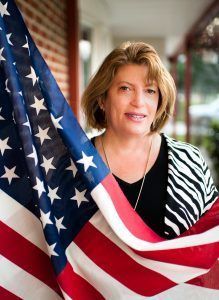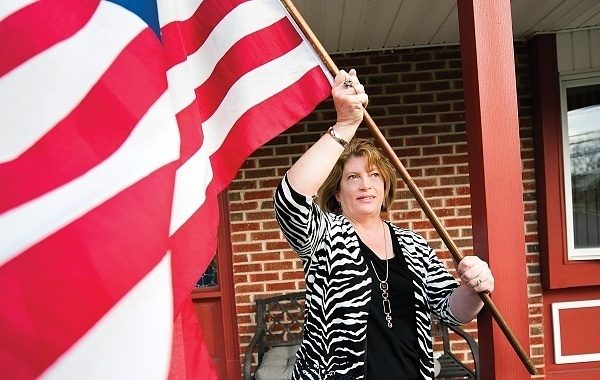Friends of Linda Recht who need to call her at work know not to dial her cell phone. That has to be locked up in a secure safe when she arrives each morning. Recht is a U.S. Foreign Service worker, so she’s used to all kinds of security measures, like all the years she had to drive around in a bulletproof, armored truck.
“I’ve never had a boring day – not once in my 30 years,” says Recht, 53, who grew up in Cherry Hill. She will retire this April after a 30-year career in U.S. Foreign Service. Currently, she is stationed in Washington, D.C., serving as a political military affairs officer for the U.S. State Department. She spoke recently to members of Temple Beth Sholom in Cherry Hill.
Recht is an expert in counter-terrorism and has spent the majority of her career in faraway places like Kyrgyzstan, Peru, and Uzbekistan and Tajikistan, which both border Afghanistan.
The responsibility of the Foreign Service worker, she says, is to protect American citizens overseas and promote U.S. national interests by tackling large-scale projects that can stabilize countries. The government employee is assigned to live and work in a foreign country for about two to three years. Upon completion of their service, they are re-assigned to another country.
 During her tenure in Tajikistan, Recht worked on a long-term effort to reform the police and border security. “We retrained the entire Tajik police force,” she says. “We promoted community policing, bike patrol, female empowerment in law enforcement and helped them establish an internal affairs department so they could investigate internal corruption.”
During her tenure in Tajikistan, Recht worked on a long-term effort to reform the police and border security. “We retrained the entire Tajik police force,” she says. “We promoted community policing, bike patrol, female empowerment in law enforcement and helped them establish an internal affairs department so they could investigate internal corruption.”
Recht says it is important to stabilize Tajikistan because of its proximity to Afghanistan.
“As a front-line, fragile state on the border with Afghanistan, it is at risk from violent extremism and Islamic radicalization,” she says. “A good relationship between a non-corrupt, competent police force and the communities they work in – where community leaders inform the authorities if a young person is turning to Islamic radicalism and extremist violence – will help stabilize the country and prevent the flow of large numbers of Tajik citizens to fight for Daaesh (ISIS). This project was very important for the long-term stability of the country.”
In Venezuela, Recht coordinated aid relief after a major flood and mudslide in 1987 devastated a resort town.
“The disaster happened the last weekend before school started,” recalls Recht. “A huge number of people were driving back on the only road from a beach resort to Maracay when the mudslide hit. Families were trying to return home so their children could start school the next day. We went in a government helicopter to tour the area. We forged through waist-high mud holding onto ropes. We saw about 1,000 vehicles stranded on the main road.”
“I arranged for donations from the American Red Cross and the Ambassador’s emergency fund, and helped organize a rescue of American personnel stranded at a beach house.”
Despite the accomplishments of her career, Recht says the biggest downside has been the time away from her family. She has been married for 22 years and has a daughter, 20, and son, 16. The family lived together in Uzbekistan for three years when the children were young. They moved back to Washington for a short time before Recht was transferred overseas again.
While stationed in Tajikistan, Recht saw her family only three times in two years: Thanksgiving, her son’s bar mitzvah and her nephew’s bar mitzvah. With a 10-hour time difference, Recht was able to Skype once each day with her family on her evening drive home from work.
“It was hard,” she admits.
But Recht has found that her children have a deep appreciation for their country. “They seem to recognize the freedom we have, the prosperity and the ability to take the initiative and decide who you want to be and choose your own future. They saw how that doesn’t exist in Uzbekistan. My son says he became a person in Uzbekistan, because when he got there he was 2 years old and when he left he was 5. He says seeing how people lived over there always made him appreciate this country and all the gifts we have. That makes me feel good.”
“It’s interesting; a lot of times foreign service kids decide they want some kind of international career and others are like, ‘Oh I never want to do all this moving again,’ and they tend to be homebodies. Our daughter doesn’t want to travel around. She’s at William and Mary with a double major in marketing and environmental policies. We’ll see what she decides to do, but I think she wants to stay in the Washington area.”
For Recht’s time abroad, she quickly notes that the majority of the residents she encountered were friendly toward Americans. “When I lived in Uzbekistan and Tajikistan, the people – actually, I guess not al-Qaeda, but that was a very tiny percentage of the population – most of the people really liked Americans. I never experienced any problems with anti-Americans in either country.”
“I was in Uzbekistan about three weeks when 9/11 happened,” Recht adds. “There was an incredible outpouring of support. We had a landlady who came over the next day wearing an American flag T-shirt. Many, many people came to the Embassy to sign a condolence book, and our entire front lawn of the embassy was covered in flowers. People would just see us and apparently they could tell we were American, and they would say ‘Oh, we’re so sorry.’”
For young people considering a career in foreign services, Recht has a clear message: “It’s a very challenging, interesting, unusual life, but you mustn’t mind moving. And your family has to be portable; your spouse has to have a career that is portable. It’s hard on people to move every few years, and it’s very hard on your family. If you are OK with that, then go for it.”
Recht did find some upsides to the frequent new job assignments. “In a way, you can reinvent yourself,” she says. “Even though you’re acclimating yourself to a new country, a new language and a new place to live, the work – creating American jobs, supporting American citizens overseas, promoting democracy, helping in crises – that doesn’t really change.”
Recht says she is looking forward to her retirement and hopes to write a memoir about the work she has done and the countries she has lived in, adding recipes from different cultures.
“That’s just a fun project,” she says.
“I’d also like to do some consulting work in counter-terrorism. I do want to keep working, because I’m too young to retire. If it weren’t for the family separation, I would stay on here. I love the work I was doing. I really feel I was making a difference for our country.”











